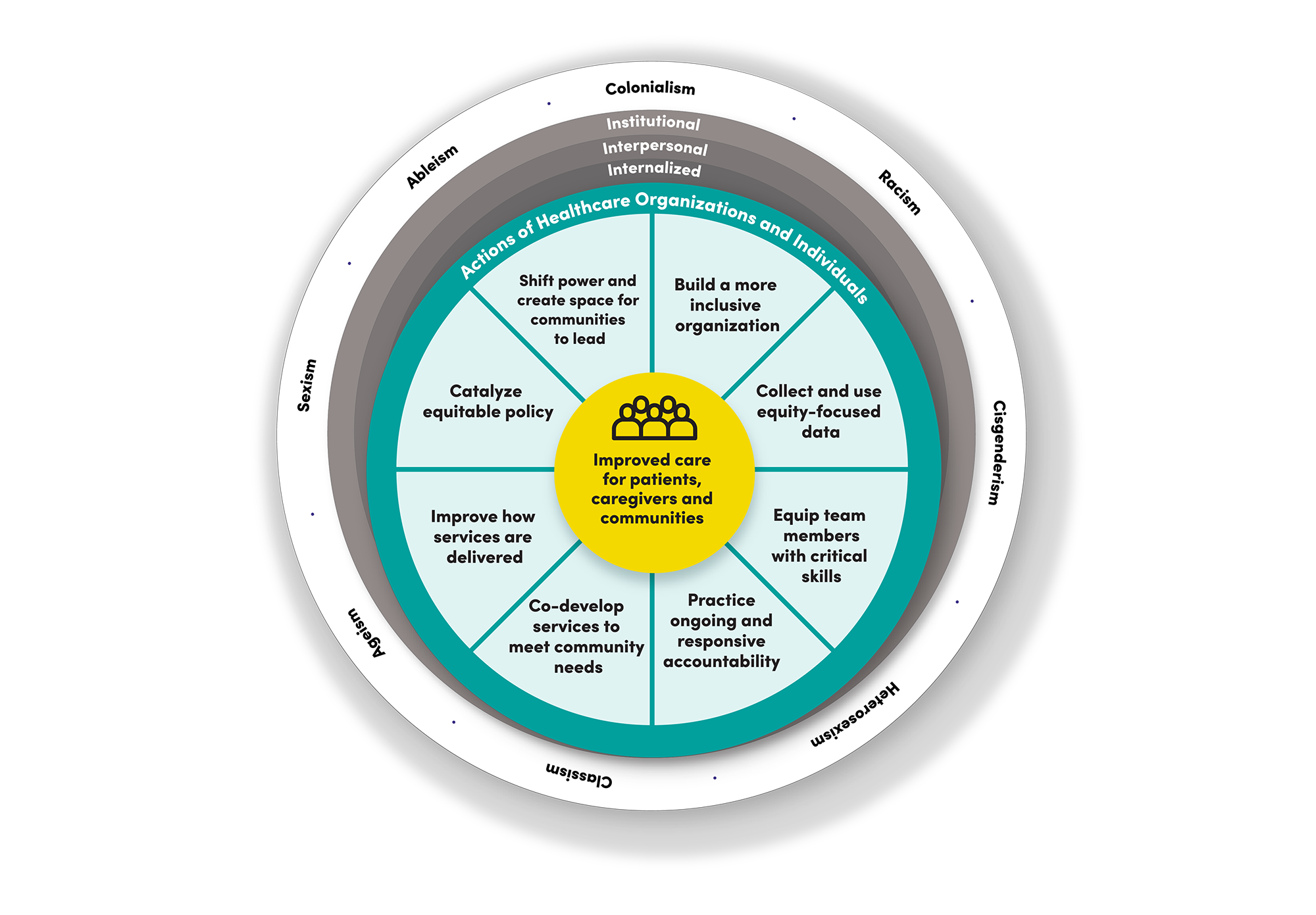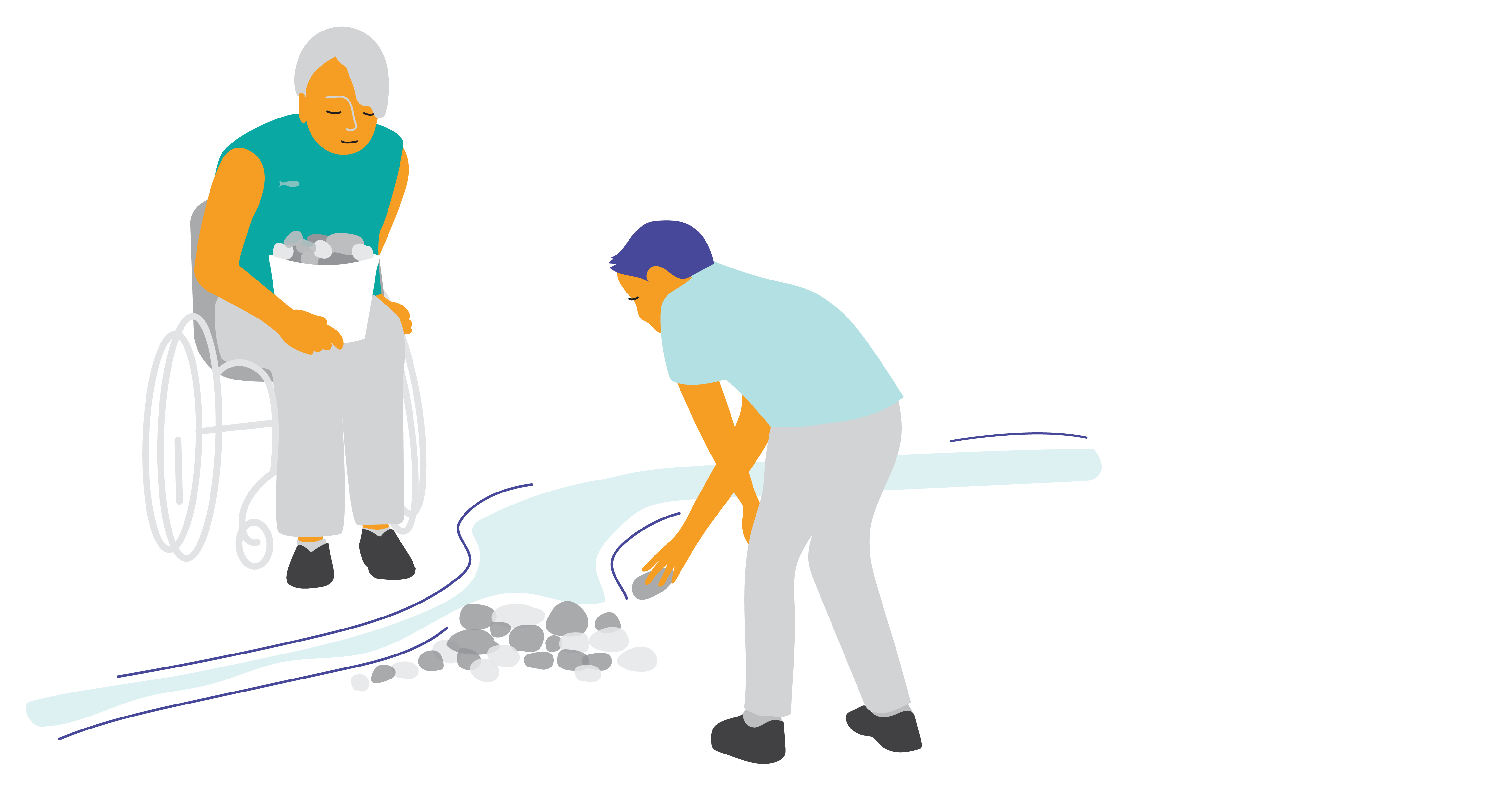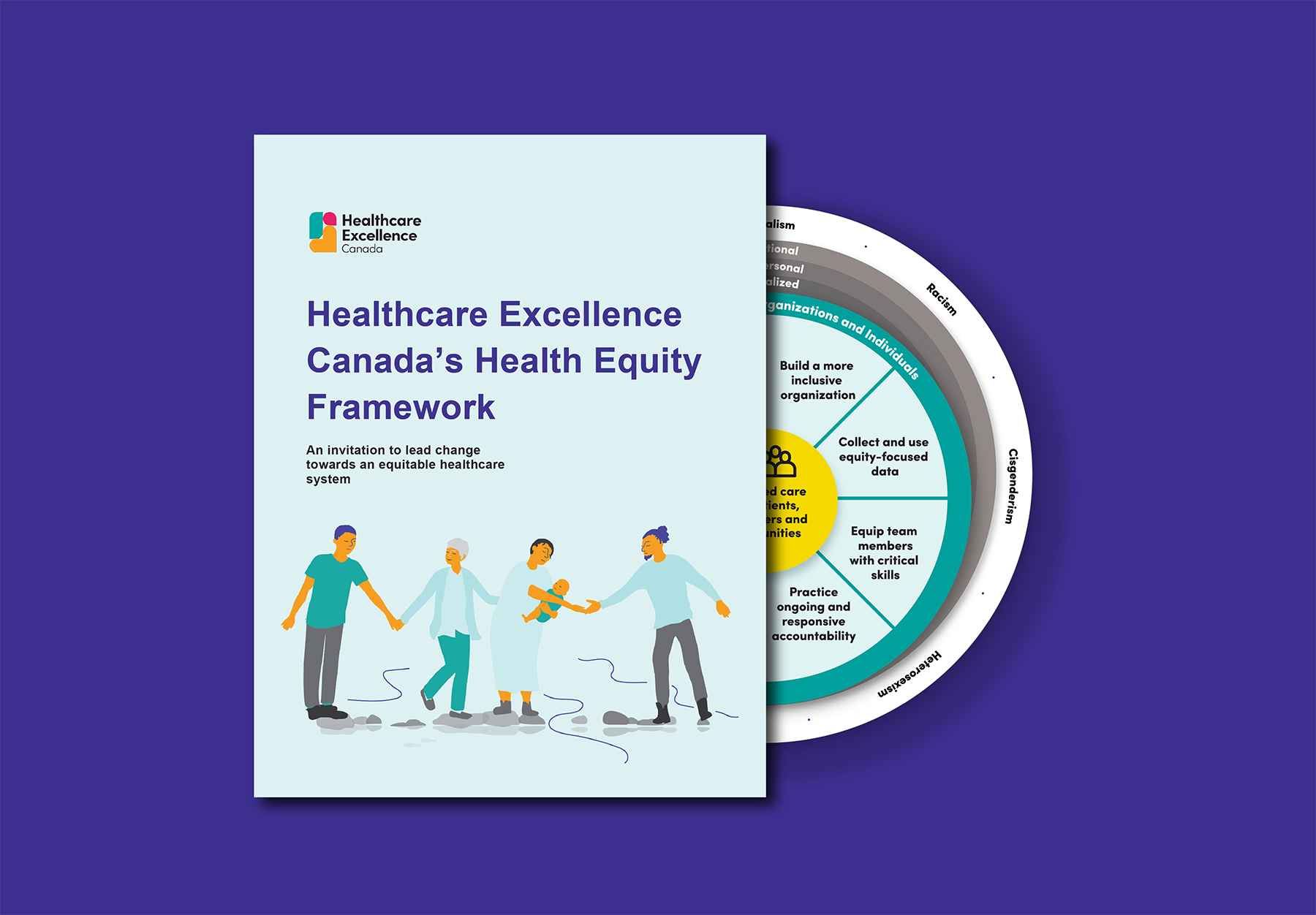Healthcare Excellence Canada (HEC) is committed to building a future where everyone has access to safe and high-quality healthcare. Achieving this vision requires confronting deep-rooted causes and systemic barriers that lead to inequities in healthcare services, quality and health outcomes.
Health equity means everyone can reach their full health potential, regardless of their identity or social circumstances. Yet, healthcare systems can reinforce inequities through outdated policies and practices, bias, stigma and stereotypes. Addressing these challenges requires deeper understanding of the interconnections between patient safety, equity, and patient experiences, and collaboration with the health, social and community care sectors.
The Health Equity Framework reaffirms our commitment to culturally safe and equitable care, and offers a roadmap for action. It calls for collective efforts to address systemic inequities and emphasizes the importance of broadening our understanding of harm, power and privilege to drive lasting change.

Equity, Diversity and Inclusion Virtual Learning Exchange: Introducing the HEC Health Equity Framework
Join us for a webinar series that explores the co-development of the HEC Health Equity Framework and how its eight actions can support health equity work and advance access to safe, high-quality care. The series will feature perspectives from health and social care partners, along with a patient partner speaker, highlighting what meaningful action toward equity can look like across roles and settings.

Equity, Diversity and Inclusion Virtual Learning Exchange: Introducing the HEC Health Equity Framework
Join us for a webinar series that explores the co-development of the HEC Health Equity Framework and how its eight actions can support health equity work and advance access to safe, high-quality care. The series will feature perspectives from health and social care partners, along with a patient partner speaker, highlighting what meaningful action toward equity can look like across roles and settings.
What’s inside
The HEC Health Equity Framework is an action-oriented resource rooted in an understanding of systems of inequities. Eight key actions offer a shared pathway for advancing equity in healthcare:
- Build a more inclusive organization
- Collect and use equity-focused data
- Equip team members with critical skills
- Practice ongoing and responsive accountability
- Co-develop services to meet community needs
- Improve how services are delivered
- Catalyze equitable policy
- Shift power and create space for communities to lead

See accessible long description
HEC is committed to regularly updating the framework to ensure its language and actions reflect ongoing learning and the evolving field of health equity.
Who should use this framework
The Health Equity Framework is for anyone involved in shaping or delivering healthcare services including:
- Healthcare leaders and decision-makers: To create structures and processes that ensure accountability to health equity.
- Healthcare providers: To improve care by committing to anti-oppressive approaches in service delivery.
- Patient, caregiver and community partners: To ensure their voices shape and guide healthcare solutions.
- Policy developers: To inform strategies, policies and practices for equitable healthcare.
- Educators and researchers: To provide a foundation for health equity studies and projects.
By using this framework, organizations and individuals can take practical steps toward creating a more inclusive and equitable healthcare system.

How the framework was developed
The Health Equity Framework was co-developed through an iterative process and learning with and from a diverse network of partners. Here’s how it came together:
- HEC formed an advisory group to explore equity, diversity and inclusion in healthcare. This group met over the course of several months to review research, identify equity-focused innovations and provide guidance on organizing the framework’s key themes.
- A larger group of partners gathered in Tkaronto to refine the framework and discuss how to put its eight actions into practice. These discussions were grounded in trust, relationship-building and shared learning.
- The development process prioritized building relationships and ensuring the framework reflected the lived experiences of those most affected by health inequities.
- HEC remains committed to revisiting and updating the framework over time to ensure it continues to address evolving needs and realities.
Authors and Contributors
Adriana Gonzalez, Ambreen Sayani, Amy Blanding, Amy Ma, B Adair, Brady Comeau, Carol Fancott, Carolyn Shimmin, Cheryl Louzado, Chris Cochrane, Ciann Wilson, Corey Bernard, Cynthia Damba, Dara Gordon, Denise McCuaig, Eric De Prophetis, Jocelyn Adams, Jay Shaw, Kaeli O’Connor, Karen Brooks, Katie Aubrecht, Kent Cadogan Loftsgard, Kortnee Tilson, Lindsay Yarrow, Lisa Nowlan, Lorraine Thomas, Maria Judd, Matthew Murphy, Meg Ellis, Miranda Saroli, Myriam Fournier-Tombs, Nandini Saxena, Necole Sommersell, Oleksandra Budna, Piotr Burek, Prachi Khanna, Raha Mahmoudi, Scotty Kupsch, Shivani Chandra, Simone Shahid, Stephanie Nixon, Sumaya Mehelay, Sutton Eaves, Timothy Christie, Tommy Akinnawonu, Vishal Jain.
We acknowledge that many of the foundational ideas, theories, and concepts in this document, and the Health Equity Framework are grounded in the work of key thinkers with expertise in the fields of decolonial practice, Black feminism, critical race theory and human and civil rights.
We give our deep gratitude to Ka-odàkedjig Elders Meeka Kakudluk, Bruce Dumont and Dalyce Huot for their guidance, participation, and support as we gathered in Tkaronto in March 2024.
HEC also acknowledges the ongoing effects of colonialism on First Nations, Inuit and Métis Peoples. Through our Truth and Reconciliation Action Plan, we are committed to addressing these specific challenges and building stronger, more respectful relationships with Indigenous communities.

Ready to Begin?
Download (PDF) the Health Equity Framework today and take the first step toward transforming healthcare to be safer and fairer for everyone. For more information or support, contact Equity-Equite@hec-esc.ca.
Related resources:
{{currentEntry.friendlyTitle.length > 0 ? currentEntry.friendlyTitle : currentEntry.title}}
- {{param_allText}}
- {{decodeURI(filterType.title).replaceAll('+', ' ').replaceAll('%26', '&')}}
- {{param_allText}}
- {{decodeURI(filterType.title).replaceAll('+', ' ').replaceAll('%26', '&')}}
- {{param_allText}}
- {{decodeURI(filterType.title).replaceAll('+', ' ').replaceAll('%26', '&')}}
